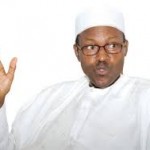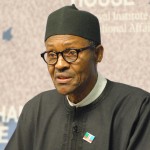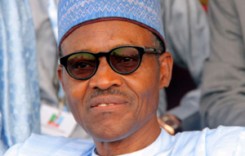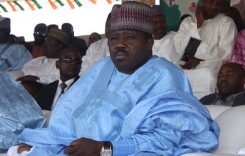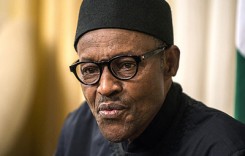In fulfillment of his promise to tackle Boko Haram terrorism, then turn his attention to crude oil thefts and the sabotage of oil installations in the Delta region of the country, President Muhammadu Buhari went on a two-day state visit to the Equatorial Guinea.
When he took power, the President made a classic statement to the effect that: “You have to secure the country to efficiently manage it.” To this day, security remains a key priority of his administration.
As disclosed in an earlier statement, the latest visit focused heavily on the planned joint efforts to police the Gulf of Guinea against pirates, saboteurs and crude oil thieves.
The major takeaway of the Presidential visit is the signing of an agreement allowing both countries to put in place a “robust mechanism for the effective coordination and management of security issues between the two countries to enable them eradicate maritime crimes and encourage peace and security in the region”.
President Buhari was accompanied on the trip by the Minister of Defence, retired Brig.Gen. Mansur Dan Ali; the Minister of State, Foreign Affairs, Khadijah Abba Ibrahim; the National Security Adviser, Major General Babagana Munguno; and the Permanent Secretary, Ministry of Industries, Trade and Investment, Aliyu Bisallah.
The national security establishment, especially the Navy, was adequately represented.
What is this agreement about?
The agreement is for the establishment of a combined policing and security patrol committee to oversee, manage, coordinate,plan and direct the execution of combined policing and security operations along the defined common maritime border of both countries.
In drawing up this agreement, a contentious issue, especially for the Equatorial Guineans was whether a patrol team of one country can cross the territorial boundary of the other.
Equatorial Guinea is a very small country whose area covers only 28,000 square kilometres. Its total population is about 1,2000,000.
Being the only Spanish-speaking sovereign African country, this tiny country had lived with the fear of its invasion by powerful neighbours, especially Gabon, Cameroon and Nigeria.
It was hard convincing them that a foray into their territory by Nigerians or the other way round, where necessitated by a hot pursuit of criminals is in the best interest of the two countries.
Nigerian officials calmed down their fears with assurances that a peaceful and stable Equatorial Guinea is in the best interest of Nigeria; that you don’t reward good neighbourliness with aggression.
Equatorial Guinea has always been our good neighbour.
When we fought our unfortunate civil war, they refused to let any part of their territory be used either by Spain or France which were pro-Biafra.
They also refused to yield to apartheid South-African pressure for an inch of space to use for launching hostile acts against Nigeria.
The signed agreement represents the shared concern about the escalation of maritime crimes such as piracy,illegal fishing,poaching,attacks by armed groups,illegal oil bunkering,smuggling of goods,drugs, human and arms trafficking,sabotage and vandalization of oil rigs and installations,banditry, harassment of crew members and sabotage and the vandalization of ocean-going vessels.
A recent escalation of pipeline vandalism has seen gas supplies to Nigerian power plants plummet by about 50 percent and crude oil exports reduced by between 250,000-400,000 barrels a day.
Generally,then, the idea is to eradicate maritime crimes and encourage the consolidation of peace and security along our common maritime border for the common good of our peoples and the stability of the region.
The composition of the committee is to comprise members in equal representation drawn from the armed forces,intelligence agencies,police, customs, immigration, gendarmerie and their ministries of foreign affairs.
It is to be chaired by Defence ministers who will rotate its leadership every four months. Meetings will hold every four months between Abuja and Malabo.
The agreement provides for combined air and maritime operations along the defined common maritime border of the two states.
Arising from this, there will be set up a Combined Air Patrol Squad and a Combined Maritime Patrol Squad.
As to be expected, these combined patrol squads are to be jointly funded and equipped. They will coordinate their activities with existing national security agencies of both states. They will also cash in on available international support.
They are empowered to “track down, intercept, inspect, search and arrest suspected persons, vehicles, vessels and goods, including goods in transit, along the defined maritime border corridor of the parties (to this agreement)”.
It is equally in the agreement that the patrols may hand over any persons or vessels suspected of either committing or aiding or abetting the commission of any crime to the appropriate authorities in either country for investigation and possible prosecution.
The agreement is valid for five years, subject to renewal upon agreement by the two states.
When he met a representation of the Nigerian community in Malabo, the President delivered his toughest rhetoric so far against corruption.
He announced that his administration will be “relentless and ruthless against those who abuse public trust”.
“In Kaduna state in Nigeria,” he told his audience in an effort to demonstrate the depth corruption, the Governor informed him that a whole primary school existed on paper, with nothing on the ground. Every month, salaries are calculated along with overheads and paid into the pockets of officials.
He then warned: “I will not spare anybody found to be corrupt. My warning fell on deaf ears in the National Assembly. Last time I spoke about the issue, I said that I heard about padding the budget for the first time following what happened with our 2016 draft. The bureaucrats removed what we wrote, after reading the budget and bowing before the National Assembly.
“The Minister of health exposed what they did. They showed him his budget and he said I can’t defend what I didn’t write. He walked out. They removed what we wrote. They are going to regret what they did. They steal to build houses in Abuja. We will put them in prison, seize the houses, sell them and put the money in the treasury. Those who think they can challenge us (in this anti-corruption war), we will see who wins in the end.”
The President also sent two important messages to the population at home through the Nigerian community in Malabo.
One, he would rather spend money taking care of fellow citizens displaced by war than embarking on grandiose projects such as a national airline.
He said: “My first priority is the two million Internally Displaced Persons, IDPs. I’am not thinking of a national carrier. I would rather clear poverty (in the country), build infrastructure such as roads, rail, power and agriculture so that able-bodied Nigerians will get jobs.”
The second important message is on ongoing violence in states such as Rivers State, where “more people are being killed than anywhere”.
Violence before and during election is, in his view, a bigger threat to the aspiration of Nigeria’s diaspora to vote in future elections.
He said: “I am still not satisfied with our elections, given what I saw happen in Kogi and Bayelsa States. I didn’t run for this office four times for nothing. One thing I have learnt is to be patriotic and to respect Nigerians. I will show respect to them by allowing their right to choose who will lead them.”
But he said at the same time that he will not allow anyone, “because they have money or social status to beat people or steal ballot boxes.”
Against the backdrop of the signed agreement, the President optimistically said that crude oil thieves and saboteurs of oil installations in the Gulf of Guinea, from Senegal to Angola are ” on their last lap.”
By undertaking this two day visit, President Buhari has turned his attention to an important neighbour. The President seemed clearly determined to give Malabo the strategic priority the country deserves.
With a stronger partnership between Nigeria and Equatorial Guinea, the two countries are equally set to reenact trade. Bilateral trade between them has collapsed. From about $300 million in 2009, trade was down to about $73 million last year. When they meet in May under the auspices of the Joint Commission, the two states are expected to finalize their positions on a trade agreement and another one on cooperation on oil and gas.
After many wasted years, the altered security and the politico-economic reality of the Gulf of Guinea appear to necessitate a strong partnership between Nigeria and Equatorial Guinea. Hopefully, this will be to the benefit of both states.
Breaking News
- 3 hours ago - Nigerian Defence Academy Entrance Exams Holds April 23rd - 0 Comment
- 3 hours ago - Dangote Bids for Peugeot Automobile Nigeria’s Stake - 0 Comment
- 3 hours ago - Nigeria No Longer Happiest Nation in Africa; Ranks 6th in Africa, 103 in the World - 0 Comment
- 4 hours ago - Senate Concur with House over Take over of Kogi Assembly - 0 Comment
- 16 hours ago - TRIBUTE: James Ocholi Taught Us The Meaning of Loyalty, By Muhammadu Buhari - 0 Comment
(Visited 1 times, 1 visits today)


